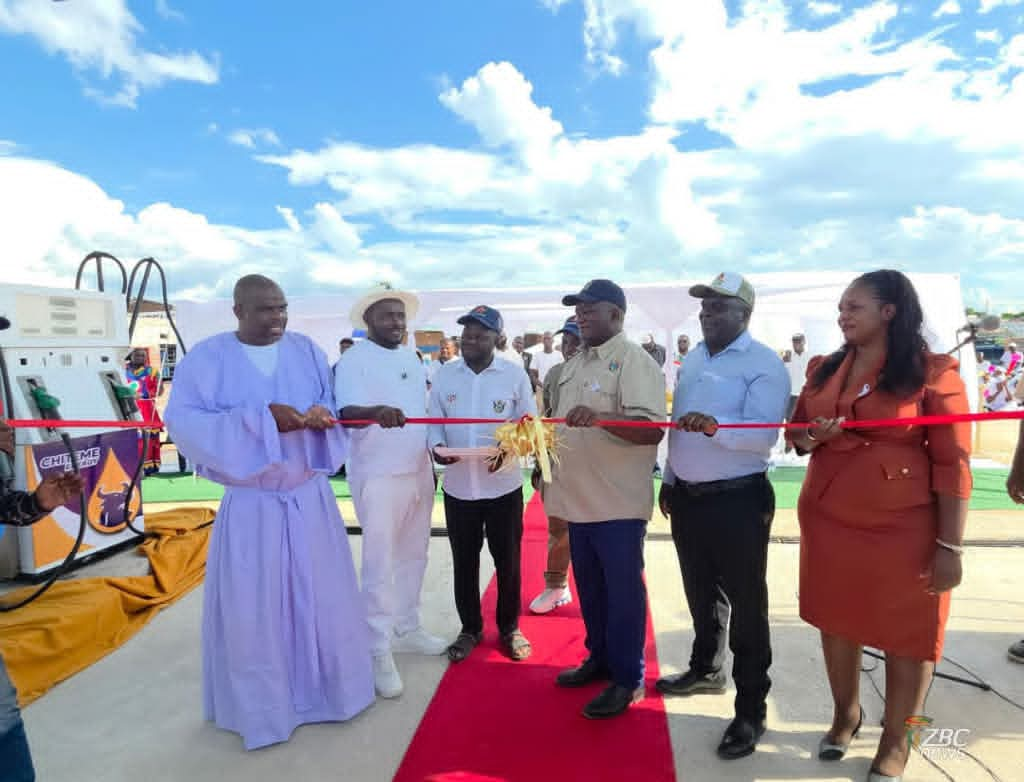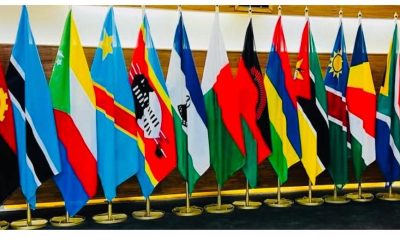Business
Spotlight on Energy Innovation: An Exclusive Interview with Darlington Chitangi, CEO of Beira Bulk Petroleum Company

In a bustling café overlooking the vibrant streets of Harare’s central business district, Hurumende News Hub Editor Abel Karowangoro sat down with Darlington Chitangi, the visionary Chief Executive Officer of Beira Bulk Petroleum Company Limited (BBPC).
Chitangi, a seasoned leader in Southern Africa’s energy sector, is at the helm of the transformative Southern Oil Pipeline Development Project, of about US$ 800 million multi-national initiative poised to redefine regional energy logistics. Over steaming cups of local roast coffee, Chitangi shared his enthusiasm for the project, emphasising its role in fostering economic growth, sustainability, and cross-border unity. What follows is an edited transcript of their engaging conversation, brimming with optimism and forward-looking insights.
Abel Karowangoro (AK): Mr. Chitangi, thank you for carving out time from what I imagine is a packed schedule. BBPC has been making waves with the Southern Oil Pipeline Development Project. Could you start by giving our readers a high-level overview of what this initiative entails and why it’s such a game-changer for the region?
Darlington Chitangi (DC): Thank you, Abel ,it’s a pleasure to be here. Absolutely, the Southern Oil Pipeline Development Project is a transformative regional infrastructure endeavor led by Beira Bulk Petroleum Company Limited (BBPC). At its core, it’s aimed at establishing a multi-product pipeline system stretching from Harare in Zimbabwe to Lusaka in Zambia, with exciting future extensions planned into the Democratic Republic of Congo and Malawi. This isn’t just about pipes and pumps; it’s about building bridges—literally and figuratively, across borders.
The project also includes a state-of-the-art bulk fuel storage terminal at Chongwe in Zambia and a cutting-edge bioethanol fuel blending facility right there in the heart of Zambia.
These strategic investments are designed to supercharge regional energy security, slash transportation costs by up to 30% through efficient pipeline delivery, and ignite cross-border trade throughout the Southern African Development Community (SADC).
Imagine: reliable, affordable fuel flowing seamlessly from the Port of Beira in Mozambique, through Zimbabwe, and onward to Zambia and beyond. It’s a lifeline for industries, a boon for consumers, and a catalyst for shared prosperity.
AK: That’s incredibly inspiring. With a price tag of about $800 million and involvement from multiple stakeholders across Mozambique, Zimbabwe, and Zambia, how has the collaboration been? Any standout moments that highlight the spirit of regional partnership?
DC: Collaboration has been the secret sauce, Abel. From day one, we’ve fostered a true multi-stakeholder alliance, governments, private investors, and local communities all pulling in the same direction. The 500 -kilometre pipeline from Msasa in Zimbabwe to Lusaka is a testament to that unity. We’ve held inclusive forums where Zambian energy experts shared insights on sustainable storage solutions, and Zimbabwean engineers contributed groundbreaking ideas for the bioethanol blending tech. One highlight? A planned joint groundbreaking ceremony at Lionsdane and in Chongwe planned for Q-1 of 2026 will bring together ministers from all three countries, and Families from local villages performing traditional dances, symbolising how this project honours the shared heritage while propelling us into a brighter future. It’s proof that when SADC nations align, we don’t just build infrastructure; we build lasting bonds.
AK: You’ve mentioned the multi-stakeholder approach—could you dive deeper into the ownership structure? I understand there’s a Special Purpose Vehicle (SPV) at the heart of this, integrating key players from across the region. How does that work, and who are the main partners involved?
DC: Excellent question, Abel, this is where the project’s genius truly shines. To ensure seamless ownership and operations, we’ve established a dedicated Special Purpose Vehicle (SPV) under BBPC’s umbrella, specifically designed to own, manage, and operate the entire pipeline system. This SPV model promotes transparency, risk-sharing, and long-term accountability, making it a blueprint for other SADC initiatives.
The integration of stakeholders is exemplary: From Mozambique, Companhia do Pipeline Moçambique-Zimbabwe (CPMZ) brings its world-class technical expertise in pipeline operations, leveraging decades of success with the Beira-Feruka line to ensure flawless connectivity from the port onward. On the Zimbabwean side, the National Oil Infrastructure Company (NOIC), now empowered under the Mutapa Investment Fund, provides critical infrastructure know-how and local market insights, drawing from its robust Feruka-Msasa operations that already handle billions of liters annually.
For Zambia, Indeni Energy OMC steps in as a powerhouse in refining and distribution, aligning perfectly with the Chongwe terminal and blending facility to optimize downstream efficiencies.
This SPV isn’t just a legal entity; it’s a powerhouse of synergy. Equity stakes are balanced to reflect each partner’s strengths, CPMZ for its upstream mastery, NOIC for Zimbabwean logistics, INDENI for Zambian end-user focus, and the Mutapa Investment Fund to anchor national development goals, with the remainder from BBPC and strategic private investors the Impero Alliance Group and Diar Consultancy Group
Regular board meetings rotate across Harare, Lusaka, and Beira, fostering trust and innovation. The result? A resilient structure that’s already attracted $240 million in Phase 1 commitments, with dividends projected to flow back to communities through job creation and skills transfer programs.
AK: Speaking of the future, the bioethanol blending facility sounds particularly innovative. How does it fit into broader sustainability goals, and what environmental wins do you anticipate?
DC: Spot on—sustainability is woven into the project’s DNA. The Chongwe facility will blend bioethanol sourced from regional agricultural byproducts, like sugarcane waste from Zimbabwe and Zambia’s thriving cassava farms. This isn’t just cleaner fuel; it’s a circular economy in action, turning potential waste into a renewable powerhouse that reduces carbon emissions by an estimated 20% compared to traditional imports. We’re talking about cleaner air for Lusaka’s bustling streets, lower greenhouse gases for the Zambezi basin, and a model for green energy that other SADC projects can emulate. Plus, it creates jobs in agro-processing—over 1000 direct roles in the first phase alone, empowering women-led cooperatives in rural Zambia. It’s a win for the planet, our people, and the pocketbook, as bioethanol keeps fuel prices stable amid global volatility.
AK: Economic ripple effects are always a big draw for our audience. Beyond cost savings on transport, how do you see this project stimulating growth in Zimbabwe, Zambia, and the wider SADC region?
DC: The economic multiplier is massive, Abel . By positioning Harare as a key distribution hub—complementing the existing Beira-Harare pipeline, we’re unlocking billions in trade value. Zambia’s industries, from mining in the Copperbelt to manufacturing in Lusaka, will benefit from a steady, cost-effective fuel supply, potentially boosting GDP by 2-3% annually through enhanced productivity. In Zimbabwe, we’re already seeing spin-offs: local firms supplying pipeline materials, creating over 1,500 construction jobs, and training programs that upskill youth in pipeline maintenance. Cross-border trade?
Expect a surge—fewer trucks on the roads means safer highways, reduced smuggling, and more fluid commerce with Botswana and Malawi. This project isn’t just fuel; it’s fuel for ambition, turning energy security into a launchpad for SADC’s collective rise as an economic powerhouse.
AK: As CEO, you’ve been instrumental in steering BBPC through this ambitious venture. What keeps you motivated, and what’s your vision for the next five years?
DC: Motivation comes from the faces behind the facts, the truck drivers in Ndola who’ll spend more time with family instead of battling fuel shortages, the young engineers in Harare gaining world-class experience. At BBPC, our culture is all about teamwork and innovation; we’ve built a diverse team that’s agile and responsive, turning challenges into opportunities. Looking ahead, I see the pipeline fully operational by 2028, with DRC extensions feeding into Africa’s green hydrogen revolution—platinum from Zimbabwe blended with our fuels for next-gen applications. We’ll hit 3.5 million metric tons of annual capacity, but more than that, we’ll inspire a new era of SADC integration. It’s not hyperbole: this is our moment to lead, to thrive, and to show the world what collaborative African ingenuity can achieve.
AK: Mr. Chitangi, your passion is contagious. Thank you for this insightful chat—readers, stay tuned for more on how the Southern Oil Pipeline is powering tomorrow’s Africa.
DC: My pleasure, Abel. Let’s keep the conversation going, energy for all, prosperity for all.
Business
MIF raises USD 1 billion in first year

Eyes USD 10 billion recapitalisation drive
Itai Mazire
The Mutapa Investment Fund (MIF) has raised about USD 1 billion in capital to support the recapitalisation, modernisation and restructuring of State-owned enterprises, marking a significant milestone in efforts to stabilise and revive some of Zimbabwe’s most strategic economic assets.
The Fund, in its inaugural annual report and first set of audited financial statements, said the capital mobilisation achieved through a mix of debt, equity and partnership arrangements represents a critical step towards addressing long-standing infrastructure deficits, modernising operations and restoring viability across its investment portfolio, whose total funding requirements exceed USD 10 billion.
The USD 1 billion already raised has been channelled towards priority interventions across the Fund’s clusters, including infrastructure refurbishment, capital expansion and recapitalisation initiatives aimed at restoring operational efficiency and improving service delivery.
MIF says the successful mobilisation of this initial funding demonstrates its growing capacity to leverage its balance sheet and attract diverse sources of capital.
“The Fund maintains a cluster-wide funding pipeline prioritising infrastructure refurbishment, capital expansion and recapitalisation initiatives,” reads the report.
“Total funding requirements exceed USD 10 billion, with approximately USD 1 billion raised to date for portfolio companies.”
According to the report, MIF is pursuing a multi-pronged funding strategy that combines debt and equity financing, public-private partnerships (PPPs) and joint ventures with development finance institutions, commercial banks and private investors.
Under this approach, the Fund structures transactions that allow private capital to co-invest alongside the State in specific projects or entities, while spreading risk and improving access to long-term financing.
In some cases, PPPs are being used to unlock private sector expertise and funding for infrastructure upgrades, while joint ventures enable strategic investors to inject capital and technical know-how into portfolio companies.
Beyond capital mobilisation, MIF has placed strong emphasis on strengthening corporate governance across its portfolio, which it says is critical to restoring investor confidence and ensuring sustainable performance.
The Fund has rolled out a governance roadmap anchored on diagnostic assessments, board induction and training, development of environmental, social and governance (ESG) frameworks, and the strengthening of internal and external audit processes.
“MIF places strong emphasis on good corporate governance, compliance and capacity building.
“The governance roadmap includes diagnostic assessments, board training, ESG framework development, internal and external audits, and alignment with international best practices.
“The Fund focuses on compliance with regulatory requirements, managing legal risks, and supporting effective governance through standardised reporting and training.
“Key governance targets include achieving 90 percent compliance with the Santiago Principles, 100 percent board member induction, and continuous professional development.”
Standardised reporting frameworks and compliance systems are also being enforced to manage legal risks and align portfolio companies with international best practice.
On performance, the Fund reports progress in stabilising and restructuring several investee companies, although it acknowledges that significant challenges remain.
These include legacy debts, historical governance weaknesses at some entities, and persistent liquidity constraints that limit the pace of recovery.
Looking ahead, MIF says its strategic focus is shifting from planning to execution, with increased emphasis on tighter portfolio monitoring, stricter enforcement of governance reforms and targeted capital deployment to unlock value.
The Fund believes these measures will strengthen the contribution of its portfolio to economic growth, fiscal stability and long-term national development.
Chief executive officer Dr John Mangudya said MIF spent its first year undertaking diagnostic assessments and portfolio valuations to inform turnaround and growth strategies.
He said the Fund had a gross asset value of USD 16 billion and a fair value of USD 15 billion as at December 31, 2024.
“Our investment strategy prioritises resilience, diversification and sustainable value creation.
“Inspired and empowered by the country’s vision of becoming a prosperous upper-middle-income economy by 2030, we strengthened and continued to enhance governance frameworks across our portfolio companies, enhanced risk management practices, and deepened our focus on operational efficiency during 2024,” said Dr Mangudya.
Business
Zimbabwe to Maintain Mineral Buying Programme in 2026 – RBZ Governor

Zimbabwe will sustain its programme of strategic mineral purchases in 2026 as part of broader efforts to build foreign currency reserves and support the long-term transition to the ZiG as the country’s sole legal tender by 2030.
Reserve Bank of Zimbabwe (RBZ) Governor John Mushayavanhu confirmed the policy direction in an opinion piece published in the state-run Sunday Mail, saying reserve accumulation remains central to monetary stability.
Mushayavanhu noted that the central bank intends to strengthen and sustain the ongoing buildup of foreign currency reserves, with a target of achieving cover equivalent to three to six months of imports. He said this level of reserves is essential for a smooth shift to a mono-currency system.
According to the RBZ governor, the strategy will be underpinned by firm enforcement of export surrender requirements, continued strategic mineral purchases, and a resilient external sector.
He added that stronger reserves would help stabilise the ZiG and improve the country’s ability to withstand external economic shocks.
Mushayavanhu revealed that Zimbabwe’s foreign currency reserves comprising gold, other precious minerals, foreign deposits, and cash holdings rose significantly from US$276 million in April to about US$1.1 billion by December. This represents roughly 1.2 months of import cover.
Zimbabwe has spent close to two decades trying to restore a stable national currency after successive failures that culminated in hyperinflation and the adoption of the US dollar in 2009. The ZiG, introduced in April 2024, is the latest attempt and currently accounts for about 40 percent of daily transactions.
The RBZ governor said reserve accumulation has been driven by mandatory mining royalties, direct gold purchases, and favourable global prices for gold and platinum.
Under existing regulations, mining and exporting companies retain 70 percent of their foreign currency earnings, with the balance converted to local currency. Since October 2022, mining firms have also been required to pay half of their royalties in physical minerals, with the remaining portion settled in cash to the central bank.
Authorities believe the continuation of mineral purchases will play a key role in anchoring the ZiG, boosting confidence in the currency, and protecting the economy from external volatility as Zimbabwe works toward full currency normalisation.
Business
Ease-of-Doing-Business Reforms Spur Local Investment in Masvingo

Government ease-of-doing-business reforms under the Second Republic continue to attract local investment and create employment, with Masvingo Province recording increased participation by indigenous entrepreneurs.
One such investment is a service station and retail complex in Rujeko suburb, established in 2025 by local businessman Against Chiteme. The project was commissioned on Monday and has created more than 30 jobs, while improving access to fuel and retail services for the surrounding community.
Mr Chiteme said the enabling business environment introduced by Government gave him the confidence to expand beyond small-scale ventures.
“The ease-of-doing-business measures encouraged us to invest and grow. This project is meant to serve the Rujeko community and we are looking to expand further,” he said.
Masvingo Minister of State for Provincial Affairs and Devolution, Hon Ezra Chadzamira, said the reforms were aimed at cutting costs, simplifying licensing processes and reducing red tape, particularly in key sectors such as retail and transport.
He added that the province had recorded increased local investment across sectors including manufacturing, agriculture, mining and tourism.
Political and religious leaders who attended the commissioning ceremony urged citizens to seize available opportunities, saying community-based investments were improving livelihoods and access to essential services.
-

 Current Affairs2 months ago
Current Affairs2 months agoOperation restore order
-

 Crime and Courts3 months ago
Crime and Courts3 months agoMasasi High School Abuse Scandal Sparks Public Outcry
-

 Crime and Courts4 months ago
Crime and Courts4 months agoKuwadzana Man Jailed for Reckless Driving and Driving Without a Licence
-

 Current Affairs5 months ago
Current Affairs5 months agoBreaking: ZIMSEC June 2025 Exam Results Now Available Online
-

 Current Affairs4 months ago
Current Affairs4 months agoMunhumutapa Day: Zimbabwe’s Newest Public Holiday Set for Annual Observance
-

 Current Affairs3 months ago
Current Affairs3 months agoBREAKING NEWS: ZANU PF Director General Ezekiel Zabanyana Fired
-

 Current Affairs5 months ago
Current Affairs5 months agoNo Racism in Our Cricket: Government
-

 Current Affairs4 months ago
Current Affairs4 months agoGovernment Bans Tinted Car Windows in Nationwide Crime Crackdown







